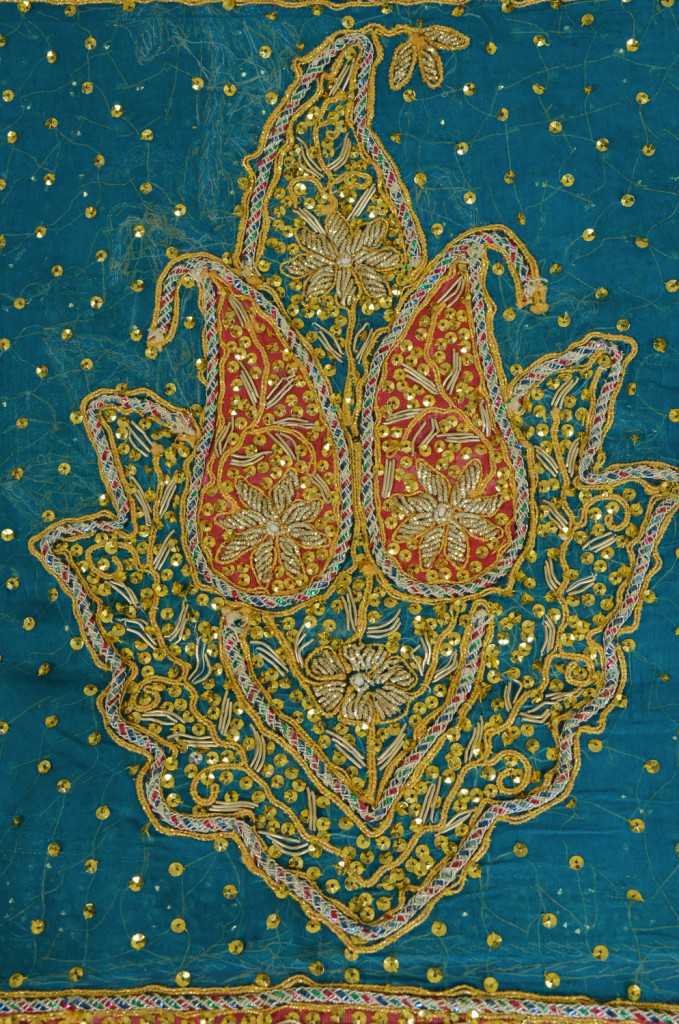===
0266,
2
===

=== |
 |
mushkil hai miṭ gaʾe huʾe naqshoñ kī phir namūd
jo ṣūrateñ bigaṛ gaʾīñ un kā nah kar ḳhayāl
1) it's difficult, the appearance again of pictures/plans/prospects that are [in a state of having been] erased
2) those aspects/faces that have become ruined-- don't {think about / pay attention to} them
naqsh : 'Painting; colouring; drawing; designing, &c.; —delineation; —embroidery; —a painting, a picture; portrait; drawing; a print; a carving, an engraving; a map, or plan'. (Platts p.1145)
naqshah : 'A delineation; a portrait; a picture; —a design; a plan; a model, pattern, an exemplar; —a map, chart... ;—features, visage; cast (of countenance); —a prospect; state of affairs or things; condition, predicament;
namūd : 'The being or becoming apparent, visibleness; appearance—prominence, conspicuousness; —show ;—affectation; —display; —pomp; —honour, character, celebrity'. (Platts p.1154)
ṣūrat : 'Form, fashion, figure, shape, semblance, guise; appearance, aspect; face, countenance; prospect, probability; sign, indication; external state (of a thing); state, condition (of a thing), case, predicament, circumstance; effigy, image, statue, picture, portrait; plan, sketch; mental image, idea'. (Platts p.747)
bigaṛnā : 'To be impaired, deteriorated, defaced, disfigured, distorted; to take harm, be damaged, injured, marred, spoiled, corrupted, vitiated, ruined, destroyed; to fall off; to fail, miscarry; to break down; to go or turn bad; to get out of order, be disordered, tossed, disarranged; to be mismanaged, bungled'. (Platts p.162)
ḳhayāl : 'Thought, opinion, surmise, suspicion, conception, idea, notion, fancy, imagination, conceit. whim, chimera; consideration; regard, deference; apprehension; care, concern'. (Platts p.498)
FWP:
SETS
MOTIFS
NAMES
TERMS == UNDERSTATEMENTTo establish 'understatement' in the first line, SRF could also point to the fact that it's not merely 'difficult', but basically impossible, to recover pictures or designs that have been 'erased'; the line thus understates the direness of our loss. But he's much more interested in the second line. With regard to it he observes that Mir has 'said something important, in a style as though it's a remark about the weather'. But he also attributes to the line 'a style of giving moral instruction' and notes that it has 'mapped out a way of passing one's life for the future'; thus it doesn't seem to be quite as bland in tone as a remark about the weather.
For what's really fascinating about the verse is indeed that second line. It's an injunction, exhorting the addressee to adopt what seems to be a 'worldly', deeply un-ghazal-like point of view. It sounds shallow and callow, naively self-centered and Ayn-Rand-ish. We immediately recognize that we ourselves don't, and don't want to, live that way; how much less could the lover in the ghazal world be imagined as doing so, or exhorting others to do so! After all, Mir has just recently given us the haunting
{265,5},
in which every corner of the garden resonates with the absence of the Nightingale (an absence that seems at least as potent as the presence of a whole gardenful of roses); thus the injunction to 'pay no attention' ('don't give them a thought'?) to the lost or gone or damaged, feels like an obvious straw man, destined only for rejection (since it hardly even requires any refutation).
SRF notes that naqshoñ in the first line can be the oblique plural form of either naqsh or naqshah . Both words can refer to a painting or drawing, but also prominently have the more impersonal sense of maps, plans, designs (see the definitions above). The verb 'to be erased' [miṭ jānā] further encourages us to think of pieces of paper once covered with lines but now blank. In the second line, ṣūrateñ has a similar range-- but it alone includes the sense of 'face, countenance' (see the definition above). And common usage gives us ṣūrat as a frequent quasi-synonym for chahrah , 'face'; beautiful people are ḳhūb-ṣūrat , and so on. Thus after the highly abstract first line, the second line more directly evokes the human face and form-- which of course doubles the distastefulness of its injunction ('Forget about your lost or damaged loved ones').
So why does Mir give us a verse with such a strange, unpleasant, unsettling injunction? Perhaps we could make a case for considering the second line as a cri de coeur, full of bitterness and despair: 'You're really a fool if you think you'll ever reclaim any lost/gone/damaged plans or people-- you might as well give up on any hopes of restoring them, instead of filling your life with vain yearning! For all the good it will do you, you might as well just forget about them!' But of course, reading the line in that tone would undercut SRF's claim that the line is a radical understatement, one that is said 'as though it's a remark about the weather'.
My own pet idea is that the verse is the pseudo-rational babbling of the crazed lover, who's completely mad and has gotten it into his head that he's finally figured out the proper way to live in the world. This explains his weird tone and his weird content both. He's accosting his listener the way the Ancient Mariner accosts the reluctant Wedding Guest. But just as is the case with the Ancient Mariner, the lover's show of rationality only reinforces the listener's increasing concern about his sanity.
Ultimately, we can always give Mir credit for jerking our chain, in the playful way that Ghalib has made his own. A miniature poem less than twenty words long, radically context-free, can readily be used to drive its readers crazy. Perhaps he's given us not just a tough nut to crack, but a nut that would break our teeth before it would yield up any kind of kernel. Ghalib would certainly enjoy doing that to us. So why not Mir?